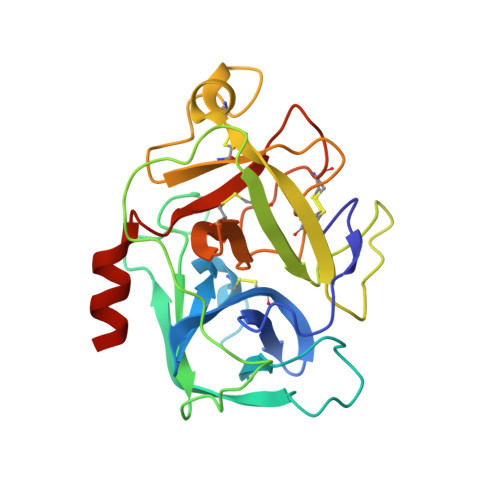Discovery of Highly Potent and Selective Small-Molecule Reversible Factor D Inhibitors Demonstrating Alternative Complement Pathway Inhibition in Vivo.
Lorthiois, E., Anderson, K., Vulpetti, A., Rogel, O., Cumin, F., Ostermann, N., Steinbacher, S., Mac Sweeney, A., Delgado, O., Liao, S.M., Randl, S., Rudisser, S., Dussauge, S., Fettis, K., Kieffer, L., de Erkenez, A., Yang, L., Hartwieg, C., Argikar, U.A., La Bonte, L.R., Newton, R., Kansara, V., Flohr, S., Hommel, U., Jaffee, B., Maibaum, J.(2017) J Med Chem 60: 5717-5735
- PubMed: 28621538
- DOI: https://doi.org/10.1021/acs.jmedchem.7b00425
- Primary Citation of Related Structures:
5NAR, 5NAT, 5NAW, 5NB6, 5NB7, 5NBA - PubMed Abstract:
The highly specific S1 serine protease factor D (FD) plays a central role in the amplification of the complement alternative pathway (AP) of the innate immune system. Genetic associations in humans have implicated AP activation in age-related macular degeneration (AMD), and AP dysfunction predisposes individuals to disorders such as paroxysmal nocturnal hemoglobinuria (PNH) and atypical hemolytic uremic syndrome (aHUS). The combination of structure-based hit identification and subsequent optimization of the center (S)-proline-based lead 7 has led to the discovery of noncovalent reversible and selective human factor D (FD) inhibitors with drug-like properties. The orally bioavailable compound 2 exerted excellent potency in 50% human whole blood in vitro and blocked AP activity ex vivo after oral administration to monkeys as demonstrated by inhibition of membrane attack complex (MAC) formation. Inhibitor 2 demonstrated sustained oral and ocular efficacy in a model of lipopolysaccharide (LPS)-induced systemic AP activation in mice expressing human FD.
Organizational Affiliation:
Novartis Pharma AG, Novartis Institutes for BioMedical Research , Novartis Campus, CH-4056 Basel, Switzerland.















